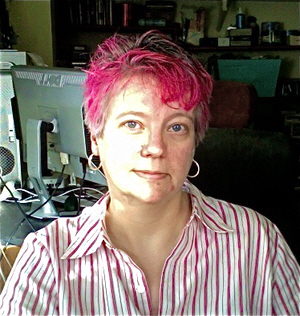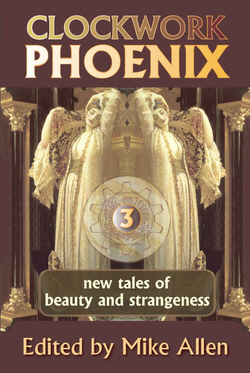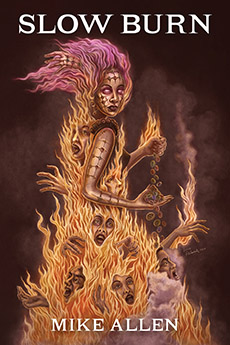A Clockwork Phoenix featured story
Surrogates
Cat Rambo

Floor 13: Government Offices
They were married on a Monday in the Matrimony office. A poster on the wall said, “Welcome to your new life!” Belinda signed the forms in her careful penmanship, but Bingo simply spit-signed, letting his DNA testify to his presence. There were three rooms processing couples and triads—larger family structure required even more complicated licenses than the one they had secured. This room was painted blue, and one wall was an enormous fish tank.
Three fish spoke to Belinda, but she ignored them. She wished she’d remembered to have the Insanity Chip nullified for the ceremony, but it had been a busy week. The fish pressed their mouths to the plastic separating them from her world. Word pearls rose from their lips, seeped upward, through the barrier, and whispered in the room.
After the computer had pronounced them spouses, Belinda and Bingo stood there grinning at each other while behind them silver fish swam back and forth, back and forth, as though imitating the waves they’d never known. A wall camera took their picture.
In a few moments, a wall slot spat out a plastic bag containing two chipkeys, a silver-colored frame around their wedding picture, and a checklist of Entitlements on a slip of dissolvable paper, already graying around the edges.
The clerk handed over the items. “This is where I tell you that you should treat everything as though it’s new,” she said. “Studies have shown that the marriages which survive the longest are the ones where the newlyweds begin to build their new life together.”
“Thanks!” Bingo said with a bright smile. Belinda could tell how happy he was, like he couldn’t stop smiling. He looked at her, and the fish tried even more frantically to say something, battering themselves against the plastic until they were just blood and silver scraps drifting in the water, but she ignored them and focused on Bingo and thoughts of butterflies.
Floor 22: Surrogates
“Preferences haven’t changed?” the technician asked as he strapped Belinda into the configuring bed. The straps turned into flowers, tiny lilac-colored bells that smelled like uncertainty.
“No,” Belinda said. The question surprised her. They had filled out the forms for marriage only two weeks ago, including the list of preferences for her latest surrogate. It was something she’d thought about for a long time. Her old surrogate had been given to her when she first started having sexual feelings, and she had put it away for good a few years ago, when she’d met Bingo.
“Do people really change their preferences at the last minute?” she asked.
“It’s not that their preferences really change, so much,” the tech said. “But sometimes after they’ve spent a little time thinking about it, they realize things that they didn’t realize they want.”
He checked his data pad. “Blue eyes, blonde hair, skin pigment pale brown, no scars, no disfigurements, face model Adam?”
“That’s it,” Belinda said. She’d picked a generic face. She didn’t believe in getting attached to surrogates. Her father had chosen to keep the one she’d used all through her teenage years rather than recycle it. The choice was vaguely illegal by virtue of a statute that was rarely enforced. A person was entitled to one surrogate, which could be replaced whenever you changed status levels, as she and Bingo had done by marrying. But her father was a sentimental sort. She wondered how he would cope now that she was out of the apartment and he was living by himself.
The flower straps tickled her wrists. Perfume netted her, dragged her into sleep, content and dreamy as the machine went about its work, measuring her and calibrating the surrogate to her dimensions.
Afterwards they looked at the visuals of their surrogates. She was surprised by Bingo’s choices: he had gone into much more detail than she had, as though designing a flower or piece of jewelry. Her face model was Maria and she wore elaborate blue tattoos like webbing over her arms and spreading across her nipples, half obscured by her long red hair.
Belinda liked the simpler look of her surrogate and she liked knowing that it was specifically designed for her, that it would smell and feel right, that it was hers in a way nothing else would ever be.
“They’ll be delivered tomorrow, after we’ve done the final calibration,” the clerk said. They signed data pads. “Congratulations,” she said in a perfunctory tone and checked to make sure their names were spelled correctly.
Floor 77: Mental Services
On Floor 77, Belinda had her Insanity Chip reset so it would factor in her marriage. The Chips were subtle, she knew. They altered your perceptions, they showed the world in the way you wanted to see it. When she’d had a fight with her best friend Angie, she’d had the Chip set so she couldn’t see Angie for a week, even when the other girl was standing, shouting in her face. When she’d finally relented, missing Angie, though, she’d found the other had gone, moved away.
“I don’t want the Chip to change Bingo,” she told the doctor. “Let him stay constant.”
The doctor fiddled with the machine, her stubby fingers recalibrating the keys. “Do you want hallucinations amped up or down?”
“What I want,” Belinda said, “is for everything to seem more significant somehow. Can you do that?”
“Of course,” the doctor said. She pressed a few more buttons and turned into a giant jellyfish that hung in the air, glistening greasily. “How is that?” Her voice was muffled, as though coming through water.
“Perfect,” Belinda said.
Bingo was in the waiting room. He had worn his best for the wedding: gleaming black pants, a silver hoop in one ear, goatee trimmed to a point. His feet were bare. He was talking to the child beside him but he broke off when Belinda came in. He smiled at her, rising.
“Ready to go home?” he asked.
Behind him the child wavered into a frog, a puddle, a big-eyed kitten.
“Perfect,” Belinda said again.
Elevator 17-3
In the elevator between floors 45-75, Belinda said, “You never thought about having an Insanity Chip? Life is more interesting that way.”
He kissed her despite the two other women in the elevator. “Life is already interesting.”
The younger woman sniffed and stared at the wall; the older woman smiled at them before she got off on floor 82. Belinda saw stars in her eyes, promise in her smile, omens spilling out of the net bag she carried.
In the shop, they bought a new bedspread, dishes, cleaning liquids. They ordered an assortment of food and chose the color of their walls. Belinda liked a yellow and white diamond pattern because it seemed to her, when she stared at it long enough, figures danced across it, harlequins in shoes with long pointed toes, kicking them up and down as they capered. She heard it in her head like a complicated marching tune.
Bingo gave her a dubious look. He liked a plain blue. But he let her pick the wall pattern and in return she let him pick a muted grey rug flecked with earth tones, like walking across fabric pebbles, a gentle hum underfoot in the key of C.
Floor 689: Green Leaf Living Quarters
Floors 650-700 were Green Leaf Living Quarters. They would live on 689, in a studio that overlooked one of the four great hollow spaces contained inside the sector.
They kissed as they entered, dropping their bags in a cloud of butterflies beside the door. The curtains matched the walls, which had been prepared in the time they’d spent travelling on the elevator. It was as far in the Building as Belinda had ever travelled in one day. Bingo had been outside it to two other Buildings, but travel like that had never interested her. From what she’d seen on the holovids, every place looked much the same. Belinda kissed the tip of Bingo’s nose before she went to the window and looked out.
Portals marked the sides of the living unit walls, and zip lines led from one to another, letting people circumvent the space on handheld lines. Down below was a great green park, filled with grass carpets and plants in pots. Over it stretched the mesh that would catch those who missed the safety straps, or the multitudes of young who delighted in falling, landing on the stretchy softness of the field.
Bingo started supper and she rearranged the pillows on the sofa, then unpacked her clothes into the wall drawers and shelves. Bingo came in smelling of spices and steam and kissed her again.
Bingo worked in advertising and Belinda was an assistant textile designer. That was how they had met. Belinda didn’t think it very romantic, but Bingo always told the story as though he was writing an advertisement for it: I Saw Her And Then Wham Be Still My Heart. It made Belinda smile when Bingo talked like that.
After dinner they fucked, and fucked again. Bingo nibbled her ears and she tickled his nipples and they gave themselves to each other and murmured sweet things until they fell asleep.
Before breakfast, they uncrated the surrogates and turned them on, flipping the knob on the back of their necks. The surrogates clicked to life, their wide eyes fastening on Bingo and Belinda’s faces. After orders, both went to the kitchen and started breakfast, then Maria emerged and began putting their belongings away. While they ate breakfast, the surrogates worked.
An animal came out of the crate that Adam had been in, which lay dissolving on the floor with the other one. Belinda didn’t know what it was. It had the usual animal shape. It turned cartwheels on the floor and made Belinda laugh.
“What?” Bingo said. He was watching her face, the movement of her eyes tracking the back and forth of the animal, which had purple fur and hair made out of noodles.
“The Chip makes me see funny things sometimes,” she said. He reached out and took her hand in his. “Funnier than me?” he said. The animal was behind him, hanging from the ceiling. Its noodles hung down, limp and shiny. The surrogates came in; they were done, so they went into their closet, ignoring Belinda and Bingo. “I don’t think of you as funny,” she said.
They fucked on the kitchen table. The cupboards talked to Belinda while she jolted back and forth, flapping plywood tongues. They sang folksongs, oh my darling Clementine and green hills hop to my Lou and sweet sweet summer enviro-clime.
On Sundays they went to her father’s for dinner with his parents, who were still married and her other father, who was not. This father, Father Bob, worked as a restaurant manager, and they ate well on last night’s restaurant leftovers, fungus shaped into simulacrums of more expensive creatures, scallops and firm-fleshed shrimp and exquisite orange roe.
Father Anton worked in a news studio and would tell them about the Anchors, what they liked, what they said. He had a fervid adoration for one Morning Host, a perky blonde woman a quarter his age, and when he told stories about her, he did so in hushed tones, like a primitive talking about God.
They drank liters of homemade beer, which Bingo’s mother distilled in her kitchen and always brought, and afterwards they played cards around the table while the holovision blared news of the Building.
Father Bob kept the surrogates, his and Belinda’s, out for company much of the time. She went over a couple of times to pick up belongings she’d left behind and found the three sitting watching holovid. Hers was the size of a fourteen- or fifteen-year-old boy; it was propped in an easy chair while the other surrogate leaned on the sofa beside Bob.
She had decorated this place herself, but since her departure, Bob had been pulling it slowly but inexorably into his own style. Restaurant containers filled the cooler. He had hung up several old pictures scavenged from the last remodel, which Belinda had designed the fabric for. The pictures showed leaves and golden light and flowers like great white cups drowning in blue water. They did not match the pink and orange carpet underfoot; they made it look old and shoddy. She did not like pictures of water. The tank in the Matrimony office had creeped her out.
She realized Father Bob was talking to her.
She said, “What?”
“Are you okay?” He got up from the sofa and peered at her. Behind him on the wall, the pictures undulated and swayed as though they were windows to some vast, tide-drawn lake.
“Sure,” she said. “I was just thinking about what it was like, growing up with you and Father Anton.” She liked the new place better; she liked the tiny balcony, the view out onto the park. Here was quieter, certainly, a bit more privileged, but there was something to be said for the hubbub that surrounded them, the people swinging past on the zip lines, taking a shortcut across the space rather than circle around the living area.
“You had a better childhood than I did,” he said. It was a familiar refrain and she tuned out the details of how his family had worked maintenance for years and finally been given the chance to emigrate to this Building, far above the ruined, rotting planet. The food riots. The cold.
She knew Bob had begged on the street and he’d been rather good at it. The same charm and glibness that served him well running the restaurant had allowed him to cajole money, food, a couch to sleep on from people. He had lived a nomadic, room-to-curb existence for several years before becoming more established. He had moved in with Anton two years before they had decided to have Belinda. And life was good now for him. They could afford surrogates to do their daily work, let them concentrate on important things.
Belinda was a Creative type, always had been, and she did appreciate the chance at that which Anton and Bob’s bloodlines had bought her, not having had to fight her way out of a less interesting job. She liked what she did and she was good at it.
Buzzing bees, colored violet and licorice and steel, swarmed through the air and she almost flinched.
“Why do you keep that Chip?” Bob said. “You’re not a child anymore, Belinda. You don’t need constant entertainment.”
“It makes me think of things differently,” she said. “It keeps me on my toes.”
She liked her unexpected world, hidden from most. She liked to know that she, and she alone, could see the faces in the wall work, the swords in the grass, the walking trees that paraded across the park every dark, late, when almost everyone was sleeping, the surrogates in the closet unless Bingo had taken his to bed already.
Sometimes Belinda wondered what life would be like without the surrogates. Most of the time she didn’t. The surrogates were there to do their work, but also in case one of them wanted sex when the other didn’t. Two weeks after the marriage, Belinda didn’t feel like it, so Bingo brought his surrogate in and fucked it there in the bed beside her.
After that she felt aroused. When Bingo just turned over, she went and got her own surrogate. Its rubbery cock stood up like a dildo, caramel colored. It went down on her, lips vibrating as she writhed, then fucked her. She thought that maybe Bingo would rouse again, that they’d fall into an endless sexual loop, but he kept snoring.
It surprised her how much she thought about that act afterwards. The surrogates were engineered deliberately so they didn’t look like real people. Their eyes didn’t track right and there was an odd translucency to their flesh. So it hadn’t been as though it was another person Bingo had been focusing on, his eyes half-closed, looking somewhere inside himself. Had he been thinking about her? She felt oddly reluctant to ask, even though they were always frank with each other about what they liked and didn’t like in bed.
On Bingo’s birthday, Belinda made a cake by mixing the contents of one packet with another and letting it set inside a plastic shaping ring. She did it herself and frosted it, painting the white surface with green fish, pink flowers, yellow guitars. The cake sang to her as she painted it and later as she woke Bingo in the morning, singing his favorite song with the cake, “Baby baby flower baby.”
She got home earlier than Bingo and she took to using the surrogate when she first did, then showering so she met him, freshly washed and ready, in the hallway, on the kitchen table, on the balcony. Today she fucked it and then showered while it and the other surrogate put up green and pink streamers that she’d pocketed from work.
Several of his friends and hers came over for dinner. She privately considered his friends brittle, and she’d heard him call hers vapid. Alfa and Veronika wrote musicals; Jonny and Leeza were clothing buyers. Veronika had an Insanity Chip too, but she made a point of saying that she did it for the sake of Creativity.
“It lets you drill down into the psyche of the really great artists,” she enthused. “Van Gogh. Pound. Bacon. Doesn’t it help you think up some really great designs, Belinda-baby?”
“Sure,” Belinda said. She looked around. She had printed up some of the fabric swatches from work. They hung on the walls in odd trapezoidal shapes, angled in and out like blueprints of rocks. She wished she hadn’t picked yellow for the curtains but she changed her mind when daffodil butterflies flew out of the fabric and spelled out words in the air: Go Belinda you’re great.
Bingo flirted with Veronika; he asked her what her Chip made her see and gave her wide-eyed looks that were almost, but not quite mocking. Veronika bit into it and wouldn’t stop talking. Over her head, Bingo gave Belinda ironic glances until she got the hiccups from suppressing giggles.
They drank wine and ate and played cards. Belinda had a hard time focusing on the hands, and Bingo said, a little irritably, “Can’t you manage to keep track of the simplest thing?”
It made her want to cry, and that made the cards even blurrier.
“Oh, baby,” Bingo said, instantly contrite. He took her cards and put them face down on the table; he brought her hand to his lips, kissing at them. “Baby, I’m sorry, what’s wrong?”
She lied. “It was something I saw. Something the Chip showed me.”
He frowned. Much later, after they’d gone to bed, he said, “Why do you keep the Chip? You have me now.”
“It makes the world less boring,” she said.
“Don’t I do enough of that for you?”
She faltered, not sure what to say. “But there are times when I’m not with you,” she said.
He didn’t say anything, there in the darkness, and after a while, she said, “I could get the Chip modified so it doesn’t go off when you’re around.” The words came out of her mouth and swelled like glowing balloons, colored coral and amber and pumpkin and gold.
“All right,” he said quickly.
The next day she had the modification made. It was easy She rode home on the elevator on waves of blue, and her feet turned into fish, into birds, into kittens, and then Bingo was walking down the corridor towards her and everything was gone.
It was odd that evening, sitting across the table from him to eat food that stayed still and silent on the plate. She curled up next to him on the sofa and they held each other in the grey quiet, while the purple diamonds stood statue-still on the wall.
When Bingo wasn’t around, she could fuck the surrogate and ride silver rails of scent, could press her hands on his skin and feel centipedes coiling underneath, could see his eyes full of daffodils and roses.
Sometimes she hid from Bingo, stepped into the closet and closed her eyes. The clothing wrapped its arms around her and she sailed away into stars and fireworks. She could feel him outside the doorway like a leaden eye, a cloud of smoke. She wanted Adam to sneak up behind him and then . . . she wasn’t sure what. She wasn’t sure what at all. And so she squeezed her eyes tighter and thought of light and its equations, like numbers on the inside of her head, and tried to dream even though she’d been forced awake.
It wasn’t enough. She began to think she had agreed to things too quickly. She said to Bingo, “What if I had the Chip gimmicked so it was just a little bleed-through when you’re around?”
His face darkened. “Why?”
“It helps me think,” she said. She fussed with the food on the counter in front of her, making dinner. She laid a slice of bread on each plate, then a slice of cheese at an angle, so the food formed an eight-pointed star.
“Are you having trouble thinking?”
“Sometimes,” she said.
“But only when you’re with me.”
“Never mind,” she said. She poured white sauce over the cheese in a spiral and sprinkled it with green flakes. She could feel him watching her.
“I want you to be happy, Belinda, you know that,” he said.
Then why do you want me to be something different than I am, she wondered. But she didn’t speak the words aloud. It was the first time she’d ever censored herself for Bingo’s sake and that night she lay awake, wondering what it meant. Bingo breathed beside her, the long slow sounds of sleep, and didn’t stir when she got up and went into the other room.
There, without Bingo, an enormous golden figure eight hung in the air, blazing with a meaning she couldn’t guess at. She sat down on the sofa. Her surrogate stirred in its closet, emerged, sat down beside her. It was ready to do whatever she liked, but all she did was take its hand, flesh and plastic intertwining.
The next day Bingo said, “You could get rid of the Chip. It’s silly. People laugh at you for having it.”
That struck her to the quick. “Who’s laughing at me?”
“Everyone,” Bingo said. “Your friends and mine. Even Bob and Anton think it’s funny.”
She thought that might not be true. She thought of Bob, sitting with his own surrogate, her discarded one, a plastic family. She knew that it was wrong to think of them like that, she knew it was like befriending a toaster or a clock. But then Bingo left the room and their toaster smiled at her, chirped hello, and slid out two pieces of toast, perfect and brown, just the way she liked them, even though she hadn’t planned on breakfast.
When she came home from work, Veronika was sitting on the couch.
“Bingo let me in,” she said. “But he went to get some groceries. Belinda, darling, I’ve got to talk to you about something.”
“The Chip,” Belinda said. She looked at Veronika, at the glossy red hair, the wide eyes.
“Bingo thinks you want something else, that’s why you won’t give up the Chip.”
Veronika’s face was too solicitous. Belinda thought about the two of them discussing her, discussing the Chip. Discussing Bingo’s dissatisfaction. It felt like a terrible betrayal.
“Get out,” she said.
She expected Bingo to bring it up again that night, but instead he said, “Have you ever thought we might change our marriage, make it a triad?”
“I don’t want to marry Veronika,” she said without preamble. He flushed at the accuracy of the guess. She said, “Isn’t your surrogate enough?”
“I have a surrogate,” he said. “I don’t have you.”
It made her sound like a possession, like a thing, like a toaster. She didn’t know what to say, how to reassure him that he didn’t need her.
His voice was tired. “Let’s go to bed. Think about it. We’ll talk more in the morning.”
She left in the middle of the night as he slept. She travelled to Floor 77, to one of the many building offices that never closed. Riding in the elevator, the buttons sang to her, the carpet advised, the lights shed waves of warmth that settled on her like a feather cloak.
In the morning, he said, “Have you thought of it?” But she went on talking to the cabinets.
He said, “I thought you made it so the Chip doesn’t work when I’m around!”
“It’s a fine morning,” Belinda said to the table, watching the wood grain melt and puddle. And then she turned and left without looking at him, because she didn’t see him anymore and only a tickle of memory remained.
 Cat Rambo lives, writes, and teaches in the Pacific Northwest. Her 100+ story publications include Asimov’s, Tor.com, and Clarkesworld Magazine. Her work with Fantasy Magazine earned her a spot on the 2011 WFC award ballot, while her first solo collection, Eyes Like Sky and Coal and Moonlight, was shortlisted for the Endeavour Award. Her most recent book is the SF collection Near + Far, from Hydra House Books.
Cat Rambo lives, writes, and teaches in the Pacific Northwest. Her 100+ story publications include Asimov’s, Tor.com, and Clarkesworld Magazine. Her work with Fantasy Magazine earned her a spot on the 2011 WFC award ballot, while her first solo collection, Eyes Like Sky and Coal and Moonlight, was shortlisted for the Endeavour Award. Her most recent book is the SF collection Near + Far, from Hydra House Books.
She writes that “‘Surrogates’ is a meditation on marriage and addiction—the implicit promises one makes to a partner and the ways those promises get broken. It started with the idea of Belinda and Bingo getting married and turning in their old surrogates, but when the idea of the Insanity Chip came to me, I knew that was the core of the story. The world is heavily influenced by Stanislaw Lem in terms of its texture, and it’s one that seems unlikely economically, but it was a lot of fun to write, particularly Belinda’s hallucinations. I love the name Bingo too; he may require his own story at some point.”

“New heights of rarity and wonder.”
—Publishers Weekly, Starred Review
 Order the anthology now! |
 Buy the $3.99 electronic edition AMAZON AMAZON UK AMAZON DE AMAZON FR WEIGHTLESS BOOKS Buy the paperback Amazon Don’t see it on the shelves at your local store? Ask for it. |















